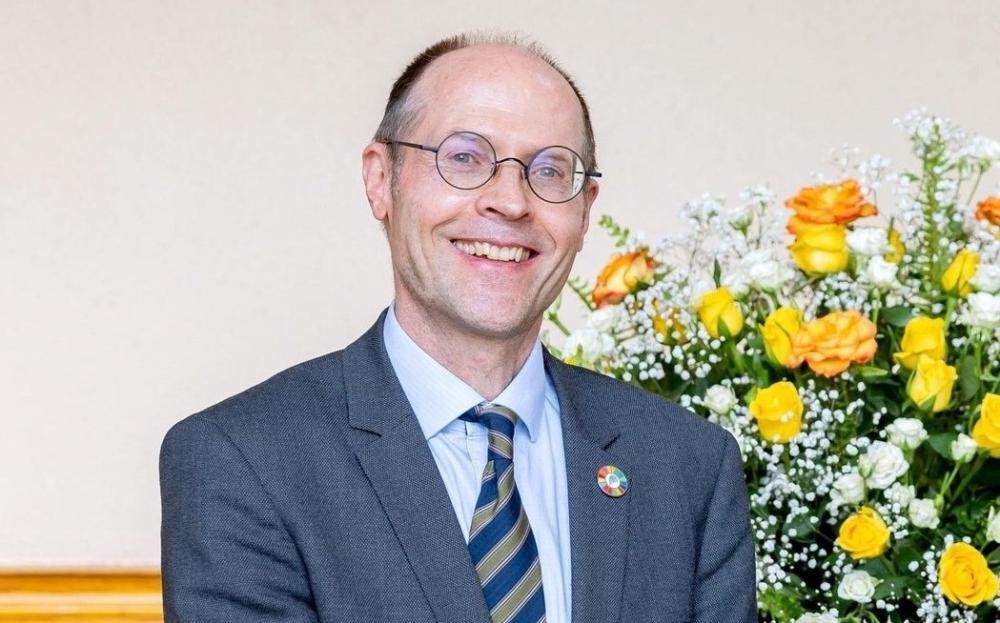Africa-Press – Rwanda. The United Nations Special Rapporteur on Extreme Poverty and Human Rights, Olivier De Schutter, on Friday, May 30, lauded Rwanda’s progress in poverty alleviation, calling for greater social protection efforts and investment in the country’s people for even better gains.
De Schutter, who held a news conference on the preliminary findings and observations of his fact-finding mission that started on May 19, highlighted key insights and recommendations to support Rwanda’s efforts in advancing social protection, economic inclusion and human rights.
During his visit, the UN official assessed national efforts to combat poverty and uphold the human rights of people living in poverty. He held engagements with government officials, civil society organizations, international partners and individuals affected by poverty across the country.
According to the seventh Integrated Household Living Conditions Survey (EICV 7), published by the National Institute of Statistics of Rwanda (NISR) on April 16, poverty rate among Rwandans fell by 12.4 percentage points to 27.4 per cent from 2017 to 2024.
“Rwanda has been making significant progress in combating poverty,” said De Schutter.
“The figures recently released on the living conditions in Rwanda by the National Institute of Statistics of Rwanda show that between 2017 and 2024, poverty was reduced from 39.8 per cent of the population in Rwanda to 27.4 per cent. That means that 1.5 million Rwandans have been rescued from poverty during this seven-year period,” De Schutter said.
“Extreme poverty figures have gone down also, from 11.3 per cent in 2017 to 5.4 per cent in 2024. We have 700,000 Rwandans in extreme poverty but, nevertheless, the situation is improving,” he stated.
Addressing the remaining gaps
De Schutter said, however, that behind those encouraging figures gaps remain.
“In particular, there’s an important gap between the urban and the rural areas. Poverty rates in rural areas are 31.6 per cent, which is almost double what we have in urban areas. Extreme poverty [in rural areas] is 6.4 per cent,” he pointed out.
What is also striking, he said, is that although Rwanda has gradually reduced inequality, cities still have significant disparities.
Income inequality is measured based on a Gini coefficient which goes from 0, which is a completely equal society, to 1 which is a completely unequal society.
“A city such as Kigali scores 0.44 which is a high level of inequality,” he said.
Inequality levels in rural areas are 0.26 which is much lower, he indicated, saying that one way therefore to summarise the situation in Rwanda is to say that in rural areas poverty is equally spread, whereas in cities, wealth is unequally shared.
Multidimensional poverty, which goes beyond monetary income, has also decreased in recent years, De Schutter said.
He indicated that it was at 57.5 per cent in 2015, compared to the current 48.8 per cent as per on the calculations from the United Nations Development Program (UNDP) and others, “which means that if we take into account access to public services, housing, education, nutrition, healthcare, the situation there too is improving.”
He made recommendations including that the government should avoid social protection funding cuts in the national budget as it may have a negative impact on poverty reduction, leaving the rural poor more vulnerable.
Social protection support in the country, he said, is a lifeline for some 500,000 households hosting 1.7 million individuals.
He also said that great care should be exercised in the selection of social protection beneficiaries to ensure that the support in this regard reaches the right recipients for greater results.
To build human capital and ensure general progress is fairly distributed, he it is essential to maintain and even increase social investment, both in absolute terms and as a percentage of the public budget.
Overall, he observed that the country registered “very impressive economic growth rates,” of the order of 7 to 8 per cent over the last 15 years, “which is quite remarkable, including by comparing to other countries in the region.” This is promising in the country’s quest to get out of the least developed country category by 2030.
It is expected that the Special Rapporteur’s final report on Rwanda will be presented to the UN Human Rights Council in June 2026.
For More News And Analysis About Rwanda Follow Africa-Press






